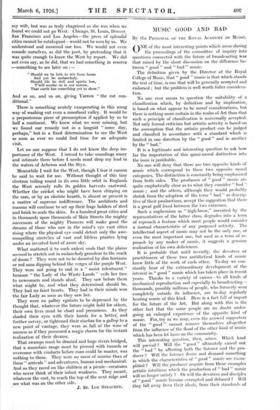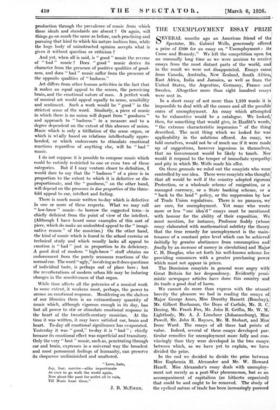MUSIC GOOD AND BAD By the PRINCIPAL OF TIIE ROYAL
ACADEMY OF MUSIC.
ONE of the most interesting points which arose during the proceedings of the committee of inquiry into questions connected with the future of broadcasting was that raised by the short discussion on the difference be- tween " good " and " bad " music.
The definition given by the Director of the Royal College of Music, that " good " music is that which stands the test of time, is one that will be generally accepted and endorsed ; but the problem is well worth fuller considera- tion.
No one ever seems to question the suitability of a classification which, by definition and by implication, is based on what appear to be moral considerations, but there is nothing more certain in the realm of Art than that such a principle of classification is universally accepted. Not only formal criticism but artistic activity is based on the assumption that the artistic product can be judged and classified in accordance with a standard- which is limited in one direction by the " good " and in another by the " bad."
It is a legitimate and interesting question to ask how far the importation of this quasi-moral distinction into the issue is justifiable.
No one will deny that there are two opposite kinds of music which correspond to these two opposite moral categories. The distinction is constantly being emphasized from both sides. The producers of " good " music are quite emphatically clear as to what they consider " bad " music ; and the others, although they would probably shrink from the adoption of the term " bad " as descrip- tive of their productions, accept the suggestion that there is a great gulf fixed between the two extremes.
Such a euphemism as " high-brow," invented by the representatives of the latter class, degrades into a term of reproach a feature which most people would consider a normal characteristic of any purposed activity. The intellectual aspect of music may not be the only one, or even the most important one, but used as a term of re- proach by any maker of music, it suggests a genuine realization of his own deficiences.
It is probable that until recently, the devotees or practitioners of these two antithetical kinds of music knew little of the work of each other. To-day we con- stantly hear of the extraordinary development of the interest in " good " music which has taken place in recent years. Thanks to a variety of causes—to all kinds of mechanical reproduction and especially to broadcasting— thousands, possibly millions of people, who formerly were completely outside its influence, are to-day regularly hearing music of this kind. Here is a fact full of import for the future of the Art. But along with this is the other fact that the same people are no doubt under- going an enlarged experience of the opposite kind of music. For, try as we may, even the avowed supporters of the "good " cannot remove themselves altogether from the influence of the flood of the other kind of music which has been let loose on the community.
This interesting question, then, arises. Which kind will prevail ? Will the " good " ultimately cancel out the " bad " by affecting both the listener and the pro- ducer ? Will the listener desire and demand something in which the characteristics of " good " music are exem- plified ? Will the producer acquire from these examples artistic intuitions which the production of " bad " music will no longer satisfy ? Or will the devotees and disciples of ".good " music become corrupted and debased ? Will they fall away from their ideals, from their standards of production through the prevalence of music from which these ideals and standards are absent Y Or again, will things go on much the same as before, each practising and pursuing that kind to which his nature inclines him, while the huge body of uninstructed opinion accepts what is given it without question or criticism ?
And yet, when all is said, is " good " music the reverse of " bad " music ? Does " good " music derive its character from the presence of positive qualities of good- ness, and does " bad " music suffer from the presence of the opposite qualities of " badness."
Art differs from other human activities in the fact that it makes an equal appeal to the senses, the perceiving brain, and the emotional nature of man. A perfect work of musical art would appeal equally to sense, sensibility and sentiment. Such a work would be " good " in the strictest sense of the word. Similarly, a piece of music in which there is no union will depart from " goodness " and approach to " badness " in a measure and to a degree dependent on the extent of this absence of union. Music which is only a titillation of the sense organ, or which is wl oily based on relations intellectually appre- hended, or which endeavours to stimulate emotional reactions regardless of anything else, will be " bad 7. music.
I do not suppose it is possible to compose music which could be entirely restricted to one or even two of these categories. But if I may venture closer to definition, I would dare to say that the " badness " of a piece is in proportion to the extent to which it is defective or dis- proportionate, and the " goodness," on the other hand, will depend on the presence in due proportion of the three- fold appeal to ear, intellect and feeling.
There is much music written to-day which is defective in one or more of these respects. What we may call " low-brow " music—to borrow the suggested term—is chiefly deficient from the point of view of the intellect. (Although I have heard some examples of this sort of piece, which do make an undoubted appeal to the " imagi- native reason " of the musician.) On the other hand, the kind of music which is found in the school exercise or technical study and which usually lacks all appeal to emotion is " bad " just in proportion to its deficiency. A good deal of modern " high-brow " stuff obtains no endorsement from the purely sensuous reactions of the normal ear. The word " ugly," involving as it does questions of individual taste, is perhaps out of place here ; but the reverberations of modern urban life may be inducing changes in the sensitiveness of that organ.
While time affects all the potencies of a musical work to some extent, it weakens most, perhaps, the power to arouse an emotional response. Mouldering on the shelves of our libraries there is an extraordinary quantity of music which, although vigorous enough in its day, has lost all power to stir or stimulate emotional response in the heart of the twentieth-century musician. At the time it was written, it may have satisfied ear, brain and heart. To-day all emotional significance has evaporated. Yesterday it was " good," to-day it is " bad " ; chiefly because its emotional effect was superficial and transitory. Only the very " best " music, such as, penetrating through ear and brain, expresses in a universal way the broadest and most permanent feelings of humanity, can preserve its eloquence undiminished and unaltered.
" Love, hate, Joy, fear, survive—alike importunate As ever to go walk the world again, Now ghost-like pant for outlet all in vain, Till Music loose them."
J. B. McEwEN.







































































 Previous page
Previous page